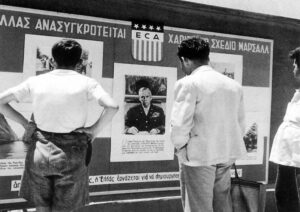Few today doubt the wisdom of the European Recovery Program, known, colloquially of course as the ‘Marshall Plan’ in honor of of the man who conceived of it and even fewer doubt the vastly positive impact it had. From re-building the war-torn economies of western Europe, both friend and foe, and tilling the soil of democracy and prosperity that lasted for decades, the Marshall Plan is rightly seen a beacon for constructive intervention and as emblematic of a time when the USA was perceived as a force for good. It is no wonder then, that calls for a reprise of the Marshall plan are frequent, especially during times of economic uncertainty.
 Today, the calls for a new ‘Marshall Plan’ have been heard most frequently in connection with the current (and likely future) travails of Greece and its challenges in dealing with its precarious financial position. Joseph E. Stiglitz, writing in Time magazine, is only one of several prominent economists to call for such action.
Today, the calls for a new ‘Marshall Plan’ have been heard most frequently in connection with the current (and likely future) travails of Greece and its challenges in dealing with its precarious financial position. Joseph E. Stiglitz, writing in Time magazine, is only one of several prominent economists to call for such action.
Greece, of course, was a recipient of sizeable funds from the original European Recovery Program (ERP) receiving some $700,000,000 a sum that placed Greece sixth in the long list of war ravaged nations that received ERP money. Greece did benefit substantially from her share of Marshall Aid, as did so much of Western Europe. However, although many are calling for and invoking the notion of something akin to Marshall Plan support for Greece, the actual impact, at the time, was not all positive. In ‘In Search of a Usable Past: the Marshall Plan and Postwar reconstruction today’, published by the George C. Marshall Foundation historian Barry Machado, takes a long hard look how money from the ERP was spent and what effect it had. His conclusions are most enlightening.
 Greece, despite the contemporary calls, had an interesting experience as a recipient of American aid. By the time the money ceased to flow, in late 1951, ‘Greece still had a worthless currency and an unemployment rate around 17% and was nowhere near the goal of a self-sustaining economy’. Although the longer term effects of Marshall Aid funds did prove to have, substantial, beneficial effects, the manner in which the aid was distributed was sometimes counterproductive and so overwhelming that it threatened to undo much of the good. Between 1947 – 49 US aid constituted some 25% of Greece’s gross national product and financed 67% of all Greek imports. The application of these funds, with American administrators struggling to come to grips with Greek life and culture, was, as Machado termed it ‘a violation of Marshall’s first commandment- [that] Europe shall save itself’.
Greece, despite the contemporary calls, had an interesting experience as a recipient of American aid. By the time the money ceased to flow, in late 1951, ‘Greece still had a worthless currency and an unemployment rate around 17% and was nowhere near the goal of a self-sustaining economy’. Although the longer term effects of Marshall Aid funds did prove to have, substantial, beneficial effects, the manner in which the aid was distributed was sometimes counterproductive and so overwhelming that it threatened to undo much of the good. Between 1947 – 49 US aid constituted some 25% of Greece’s gross national product and financed 67% of all Greek imports. The application of these funds, with American administrators struggling to come to grips with Greek life and culture, was, as Machado termed it ‘a violation of Marshall’s first commandment- [that] Europe shall save itself’.
Greece’s eventual emergence, through domestic political unrest and civil war, owes much to the sterling efforts of those committed to the Marshall Plan but also offers a valuable insight into the complexities of such aid and how, from such a historical distance it all looks a lot simpler that it actually was.
